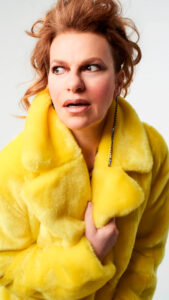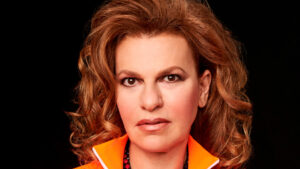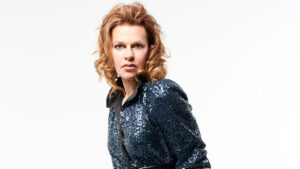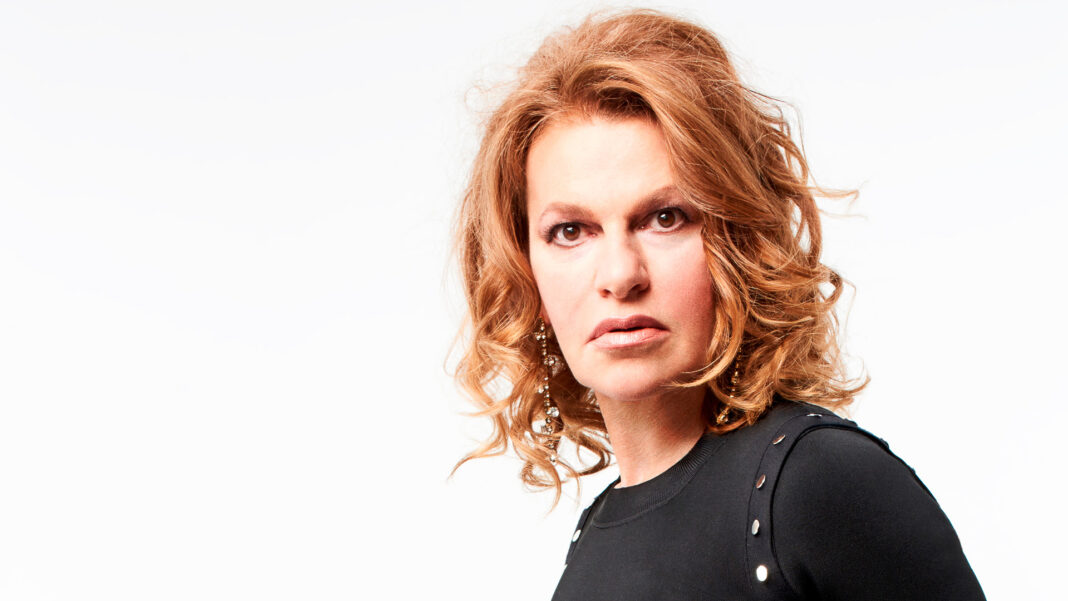
I first met Sandra Bernhard at the post-premiere party for the film Barfly, written by Charles Bukowski. At that time she made regular appearances on the David Letterman Show, was doing stand-up comedy and had launched an acting career with her appearance in Martin Scorsese’s film The King of Comedy.
Two weeks ago I caught up with Bernhard about the state of the world, her role on Pose and her upcoming performance at The Wallis in Beverly Hills of her one-woman show Madness and Mayhem on Friday, October 8th. For those in Palm Springs, she has an appearance tonight at Oscar’s.
Bernhard is someone who has always spoken her mind. We jumped right in when we spoke by phone. It was a free-flowing, thought-provoking and reflective conversation. What follows is most of that conversation which has been edited for length and clarity. This interview includes the use of profanity.
The two-line description on The Wallis website of your show says that you’ll “look back over the madness and mayhem and predict the future.” Do you see this madness and mayhem ever ending or are we in an endless cycle of absurdity without resolution?
Well, I’m afraid to say I think we’ve really gone down the rabbit hole this time. And I don’t really foresee ever going back to civility or a polite discourse ever again. I think people have really baked themselves in the negativity and the idea that, you know, everybody has the right to their opinion and they know better and all the shit is like, good luck with that.
There are people who spend years studying, whether it’s medicine or law or journalism. And these are people who are tried and true. Are they one hundred percent on target? No, but they have a better chance of breaking down whatever the issue is than you do or I do. I mean, I’ve been performing for forty-five years, so this is what I’m really good at. But I don’t know enough about vaccinations or international policy to put my two cents in. That’s not how it works. But I don’t think people are ever going to look at it rationally again.
Do you have do you have any faith that the American democratic experience is anything other than borderline comatose at this point?

I don’t think it’s comatose. I think people like us are very passionate about keeping, you know, the country in balance. Thank God everybody got motivated. We have done a little bit this past year where we kind of got ourselves back into the game. Like the abortion debacle down in Texas, but spreading across the country. I think we will persevere – women and the right tone will moderate it. I think that it’s going to take some doing. But now we have to battle the Supreme Court, you know, because they are all twisted and fucked up. So, yeah, a lot of work to do every day. But I think the people who care are in the trenches doing it right.
During the pandemic a recording of Madness and Mayhem was released on Spotify. How has the show evolved since you recorded it?
There’s a lot of new material that is reflective of what we’ve gone through individually and collectively.
I would assume that watching or reading the news would have to be a constant source of inspiration. How do you edit down what truly desires commentary and what just irks you and you just have to shrug it off?
I really try to keep my material more evergreen, even within my experiential aspect of it. The moments that I talk about are more oddly kind of pedestrian. There will be moments in the show that I do get kind of head on about it, but I feel like we’ve been pummeled to the point of exhaustion. And I like to take a more absurdist, you know, approach to whatever’s going on and something that in a way that maybe nobody ever thought of before. And I try to keep my material really sort of a surprise and fresh. So little things that I’ve observed during this period and the bigger things together.
You did an interview with Miriam Schnall for Feminist.com in 2010 and you said “Every time I get on stage, it’s a brand new experience and it’s always a challenging, wonderful opportunity to get deeper into my craft and who I am as a person.” What discoveries have you made about yourself in the eleven years that followed?
I think every day is, you know, sort of a deeper dive into your emotions and psyches and relationships. Ten years ago my daughter was 12 years old. Now she’s 23 and she’s on her own and she’s working in the city and she’s blossomed. The ensuing years were challenging because every kid goes through so much, you know, it’s just you got to be in it to win it. And so when you see your kid come out the other side and they’re really flourishing, it’s really exciting.
I’ve been in my relationship with my girlfriend for 22 years and that keeps evolving. You got to work through your struggles in relationships, you know, romantic relationships. It’s not easy living with somebody day in, day out. And we went through the pandemic together and we actually had a great time. But we really enjoy each other’s company. We cooked. And yeah, it was, you know, of course, sad and a little lonely in some ways. But thank God we have each other. You never know where the road is going to lead. So you just kind of keep powering through and being open to whatever’s there when you take the next exit.
I saw your 1983 appearance in the Comedy Store 10th Anniversary Special. It occurred to me that Cardi B and Megan Thee Stallion just caught up to you. What are your thoughts about how women owning their sexuality has evolved since you started your career?
Oh, my God. In 1975 that was on the very precipice of the hardcore feminist movement, which kinda was my instruction manual for life. So I took everything I learned and said, “I’m not going to go on stage and pretend that I’m not attractive or some guy has rejected me.” I’m going to break it out and be like a real, true feminist. I’m just going to assume that people think I’m beautiful. That they know I’m in control of my life, my sexuality. That was where I jumped off from. And nobody had ever done that before, certainly not in stand-up comedy.
I just continue to always be on that path. I’ve never been self-deprecating. I’ve never taken cheap shots at myself or other women. You know, it’s like you guys walk the walk or you better talk the talk and vice versa. So I’ve always stayed true to all of that and I’m proud of my work and I’m glad that women are finally feeling liberated.
Why was it personally important for you to be a part of Pose once you were offered the chance to do so?
It was like coming full circle of being on the scene at a time when, you know, your friends were dying. And also the whole trans world was just sort of like looked at with a total contempt. And so now to me, like not only to be in a show that’s celebrating those same people, but also like it’s an opportunity to really look back and resolve some of the unfelt emotion and the fallout of what it all meant. As an actor, you know, this is a great opportunity to play a character who was just totally committed to saving people’s lives and putting their own life on the backburner.
Which is interesting for that storyline to come out in the midst of a time when so many people have had to rely on people exactly like the nurse you played.
Isn’t that ironic? People who we knew – AIDS victims – people who would have done anything to have a vaccination. They would have given everything just to be able to live and get better. But, you know, today people seem to think we’ll get through it. And I mean, it’s just selfish. It’s crazy. I don’t want to get didactic when I think we all feel the same way – except the people that are perpetrating the stupidity.
If I did my research properly. I believe you saw Carol Channing when you were eight years old.
Eight years old. Yeah.
I know she inspired you. And she once said something that seems to me like it would sum up what at least my view of your career. And I’m wondering if it’s also yours. She said “Regret leads to negativity and negativity kills creativity.”

I couldn’t agree more. I mean, yes, yes, yes, yes, yes. I’m just happy because I get to keep doing what I do, you know, and occasionally I end up on a TV show or in a film. But I’ve managed to take control of the reins of my career with my life performing – which is hard work; writing and keeping it fresh and going out on the road. It’s not easy, you know, and I mean, maybe I wouldn’t want to do it in ten years, but I still want to do it now.
So I don’t know. I just enjoy my life. I enjoy the quotidian: I like going to the grocery store, I like doing laundry, I like washing dishes. It doesn’t take a lot to make me happy. You know, I love traveling, which I’ve missed terribly. I can’t wait to go back to Europe and have more adventures and see old friends.
The fame thing is a trap. It’s a real trap. And of course, you want to stay out there and let people know you’re still doing your work. And that’s part of, you know, perpetuating your craft and your career. But there’s a very definitive line between needing attention and just letting people know, “Hey, I’m coming to your town, come see me. Remember this? I did that, that was fun.” I have a more carefree attitude about it than a lot of people and I think that’s kept me happier in the long run.
Have you always had that carefree attitude?
No, I haven’t. I used to say I’m disappointed or I didn’t get what I deserved. You know at a certain point I don’t have the energy for it. I do want to keep working and I do want to do more acting. But there’s a lot of talented people out there that you’re competing against. And sometimes you don’t get a part and get what you want and you got to go, “OK, that’s cool, onto the next thing you know.” I’m just like, I’m cool. I’m good with what’s happening and just happy to keep trucking along.
For tickets to see Sandra Bernhard at The Wallis, please go here.
All photos of Sandra Bernhard/Courtesy Sandra Bernhard and The Wallis













Very enjoyable!
Thank you, Michael!